
by Gideon Marcus
Reversed metaphors
As we speak, I am packing for my trip to this year's Worldcon. I'm not sure what to expect other than I understand I'll be on a lot of panels. I'm mostly looking forward to seeing friends like Tom Purdom, Larry Niven, Ted White, and more.
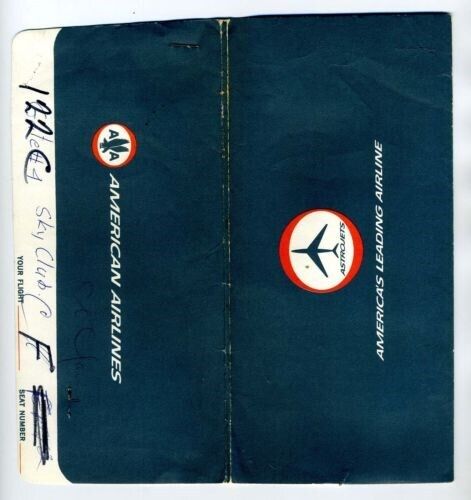


My excitement is somewhat alloyed by the most recent magazine I've just finished. After reading this month's Analog, I find myself asking, "Is this the state of science fiction?"
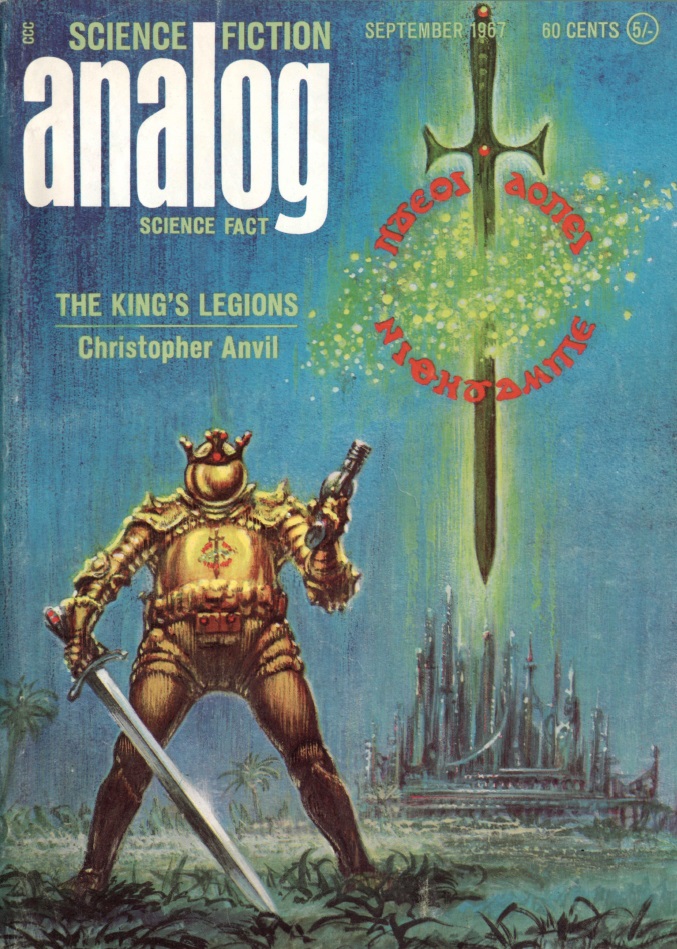
by Kelly Freas
The King's Legions, by Christopher Anvil
This month in Science Fiction Times, Norm Spinrad talked about how every editor has their pet authors. Chris Anvil is the one who panders the most to Campbell's sensibilities, producing story after story of farcical garbage. Legions continues the tale in which three planetary exploiters, who dealt with a planet controlled by robotic overlords by developing a emotional control nerve agent.
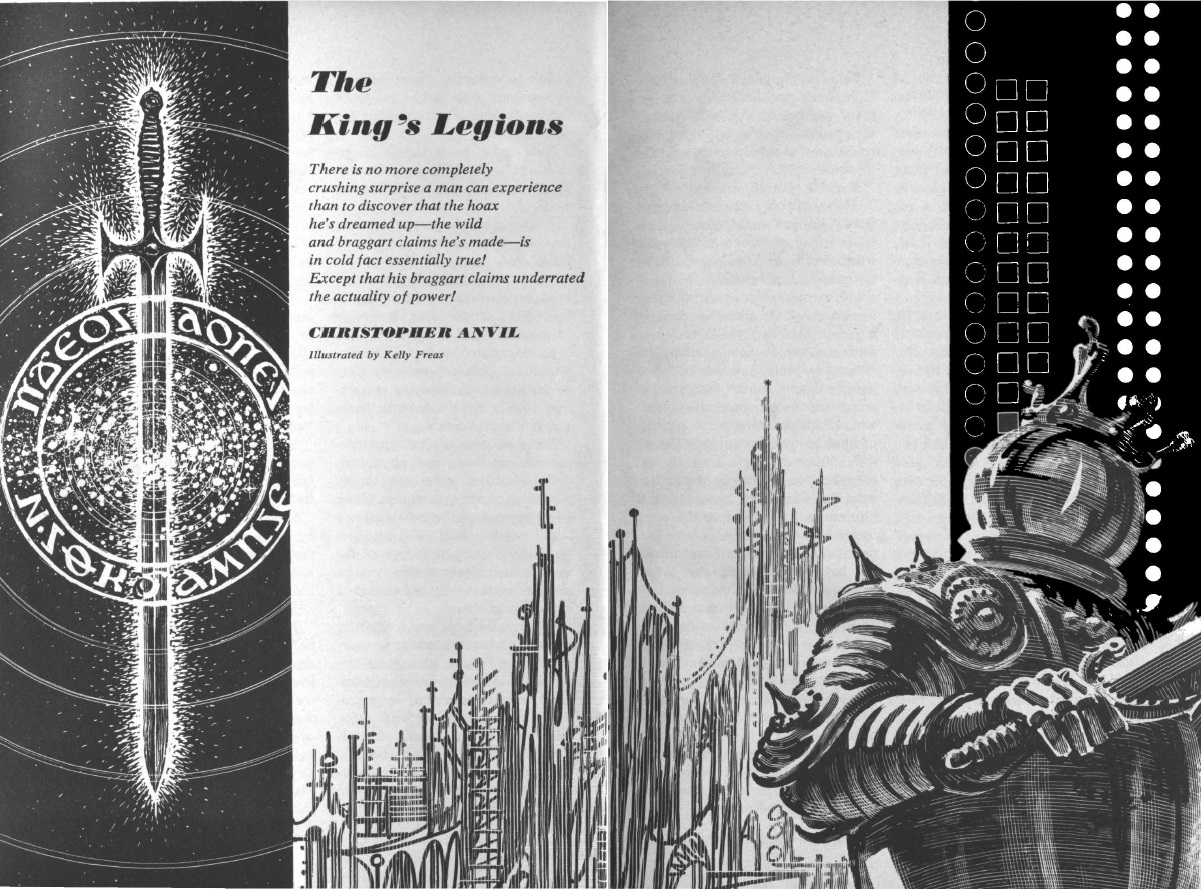
by Kelly Freas
Last installment, said trio dealt with the collapse of society that ensued by assuming the roles of agents of competing feudal overlords, creating the illusion of a threat too big to contest by the planet's ragged revolutionaries.
This time around, a cadre of pirates, lured by the treasure said planet might offer (as well as the representatives' ships) have arrived bent on conquest.
I'll be honest. I got about four pages into this, flipped through to see that the damned thing is nearly 70 pages, and decided for once I would abrogate my responsibilities. To quote Buck Coulson in this month's Yandro, "I can't read all this crap, and this seemed to be a good one to miss."
Two stars.
The Pearly Gates of Hell, by Jack Wodhams
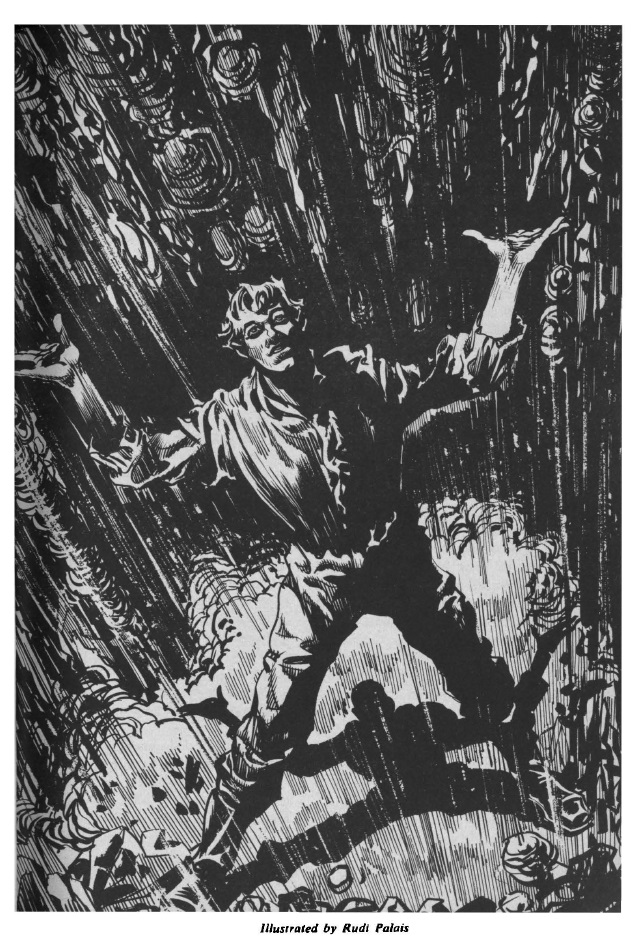
by Rudolph Palais
Lurid account of a man's endless attempts at suicide, thwarted by a society that really wants its members to stay alive–forever.
Of course, even if one is successful, that doesn't mean surcease…
Bit of a tired one-note, this one. Two stars.
The Usefulness of Nicotine, by Professor J. Harold Burn, FRS
This month's science article is a reprint, cacklingly presented by John W. Campbell, inveterate smoker. Oh sure, the article writer concedes, smoking might kill you, but look how happy and productive you'll be before cancer does you in! And here are all the gruesome details of the cats and rats vivisected to prove our point.
No thanks. One star.
Fiesta Brava, by Mack Reynolds
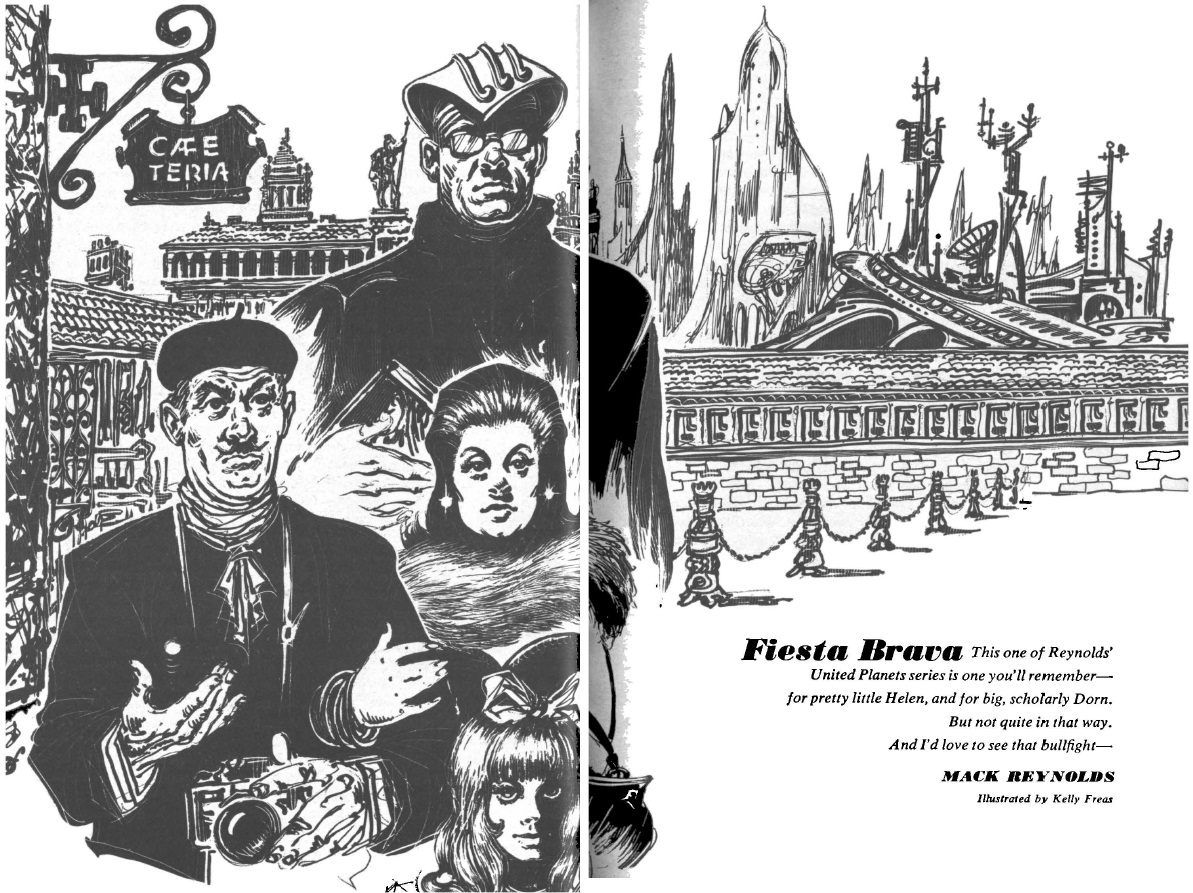
by Kelly Freas
The misadventures of Section G, whose task is to ensure none of the United Planets gets too backwards lest they be easy prey for the (yet unmet) alien menace, continue. This time, the agents sent by Director Sid Jakes are a botanist from a heavy gee planet, a cordon bleu chef with a talent for object throwing, a colorless matron with a photographic memory, and a diminutive 25 year-old who looks like she's eight.
This quartet is sent off to Falange, a colony of Spanish emigrants who have elected to preserve the police state of Francisco Franco long after his passing. High jinks ensue.
Fiesta reads like Heinlein writing a Retief story, with Reynolds' patented history lessons thrown in. To wit, this time we learn about bullfights (which Mack presumably saw when he was in Spain), the assassination of Archduke Ferdinand, and why slaves really are happier than we give them credit for. After all–it's not as if there were ever any slave revolts.
I guess Reynolds' travels never took him to Haiti.
Anyway, it's not very good, but if you go for this sort of thing, it is readable. I guess I'll give it a three. I'm trying to be nicer these days.
Important Difference, by E. G. Von Wald
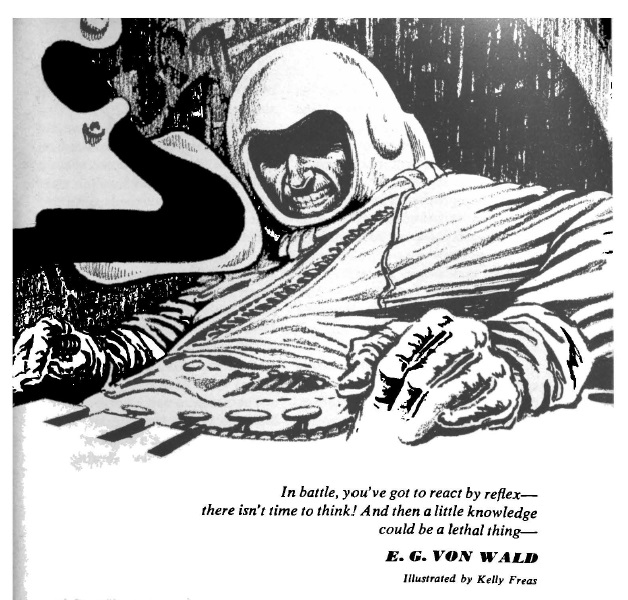
by Kelly Freas
Humanity has been at peace for 500 years, but this tranquility is disturbed when (putatively) bug-eyed aliens appear and start shooting. One three-man scout becomes the first recon ship to successfully engage the enemy…and discover their true shape.
The "twist" is telegraphed as loudly as "What hath God wrought?" but I did appreciate how our race might evolve to the point that, even if our enemy looks like us, we could find a warlike nature so repellent as to mark a drastically different species.
Another low three star.
Lost Calling, by Verge Foray
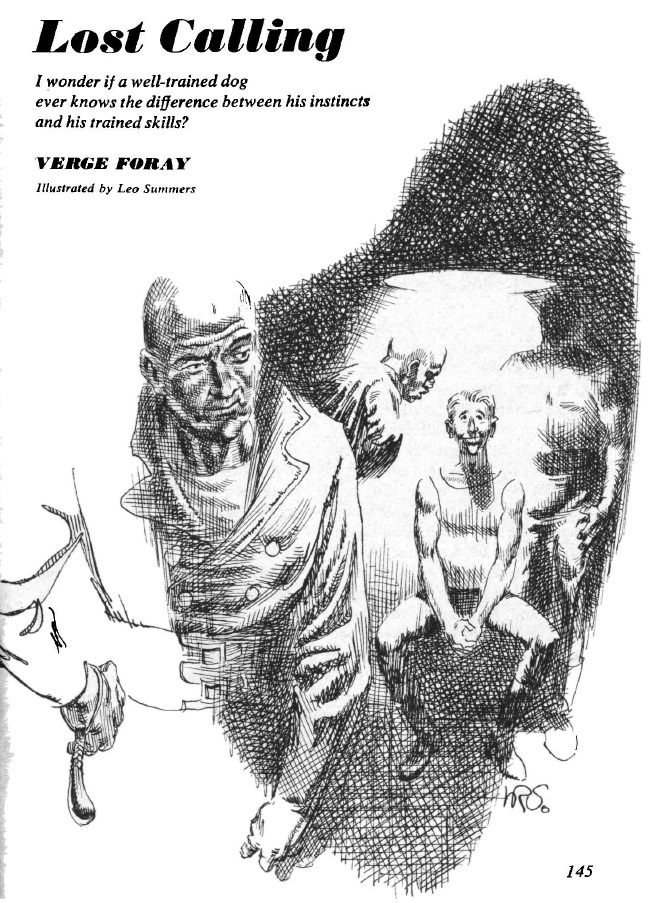
by Leo Summers
Ingenuous young Dalton Mirni is picked up by a tramp freighter after being (so he says) in the captivity of aliens for 16 years of his life. The problem is there are no aliens, at least that humanity knows of. Not only that, but there is a big blank in his memory. He knows he was being trained for a singular profession, but he has no idea what it was.
Still, he looks on the bright side. After all, he is universally liked, by the crew that picks him up, the planet of Fingal (enemy of Earth), and the Earth people themselves. And Mirni has the uncanny ability to solve people's interpersonal problems.
Of course, there can't be any connection between this skill and his lost memories…
I appreciated the tone of this story, and it's also pretty well done. Definitely the best thing in the magazine, though I don't think I'd give it a fourth star.
Bad data
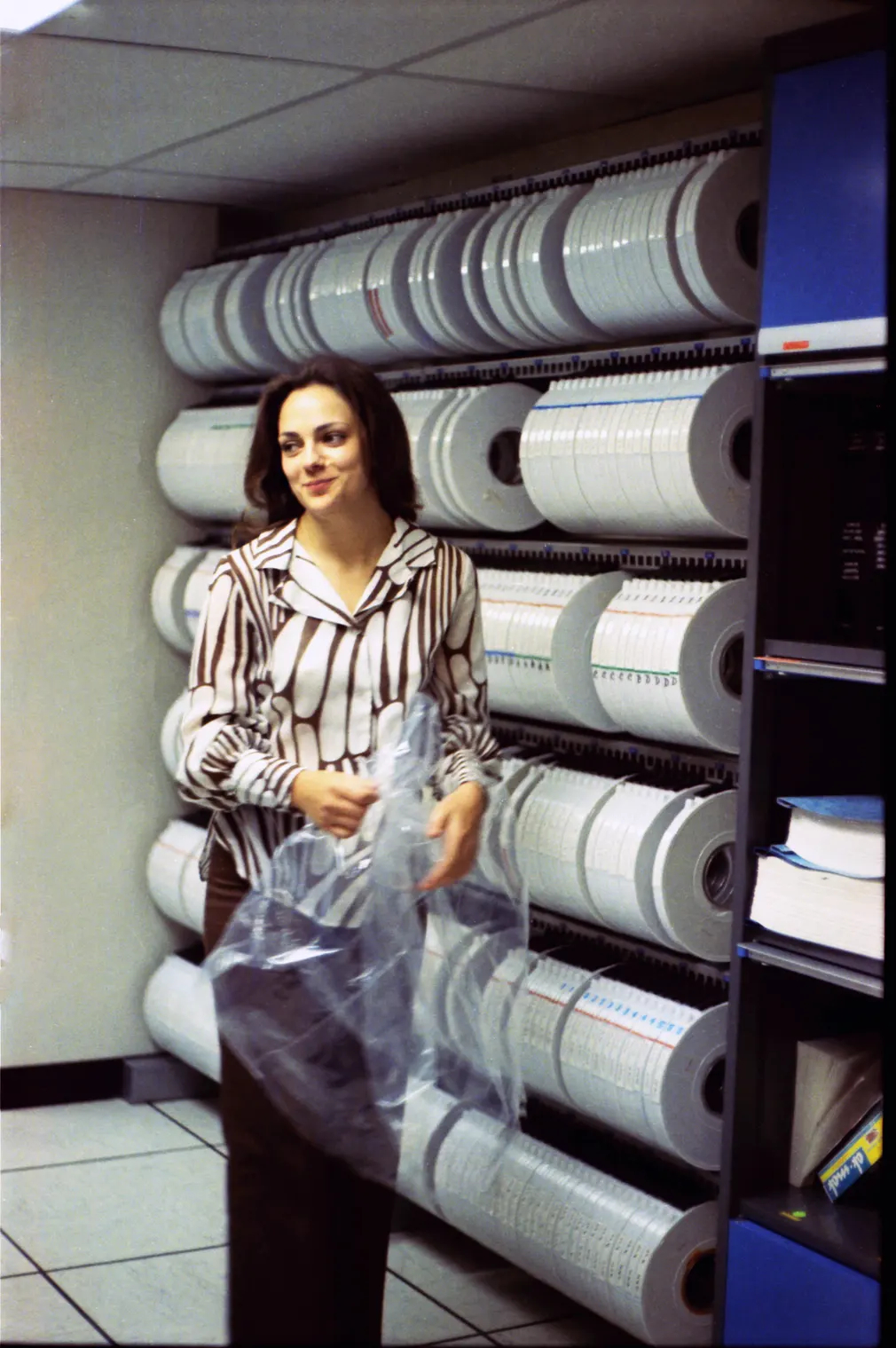
All in all, pretty grim. Even being generous with my ratings, Analog clocks in at a dismal 2.3 stars, beaten by every other magazine and short story collection this month. In order of decreasing badness, we have Fantasy and Science Fiction (2.8), IF (2.9), Orbit 2 (3), Fantastic (3), New Worlds (3.2), and The Devil His Due (3.2).
You could take all the four and five star stories and fill two digests (or thin books), which is pretty bad given we had seven to choose from. It was a bright spot for women, though, as they contributed nearly 16% of the new stories published.
So is all hope lost? Not necessarily. I've already started on next month's Galaxy, and Budrys' book column discusses how the New Wave of authors (Aldiss, Ballard, Zelazny, Delany, et. al.) are revolutionizing the field.
They just aren't doing it in the pages of Analog. So long as Campbell remains in the editorial chair, I suppose the revolution will remain untelevised.
We'll see how long that lasts. Even Alabama integrated…

![[August 31, 1967] I wouldn't send a knight out on a dog like this… (September 1967 <i>Analog</i>)](https://galacticjourney.org/wp-content/uploads/2022/08/670831cover-672x372.jpg)
